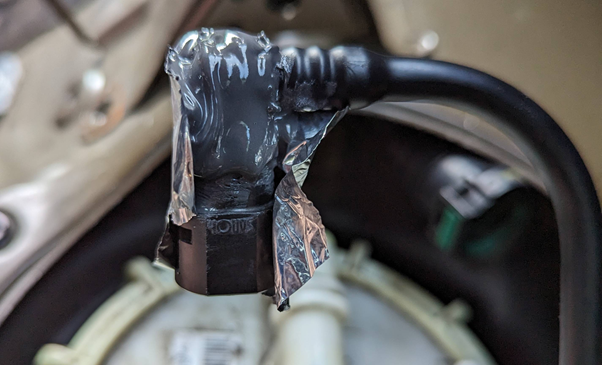What triggers a fuel line to leak?

If you stumble upon a pool of what appears to be fuel on the ground, don't dismiss it. It could be indicative of a leaking fuel line — a potentially hazardous issue that's easy to overlook. Fortunately, this guide will assist you in determining the necessary steps to address it.
5 Indications of a Fuel Line Leak
Whether your vehicle's fuel line is made of metal or plastic, here are a few telltale signs of a leak:
1. Fuel Odor
Do you detect the strong scent of gasoline in and around your vehicle? This could signify a fuel leak. And if your gas tank and other components of the fuel system seem to be in good working order, your fuel lines may be at fault. Please note that inhaling gasoline fumes can pose several health risks, including respiratory issues. Therefore, it's crucial not to ignore the smell of gasoline and promptly address any leaks in your vehicle.
2. Visible Fuel Leaks
While driving, a fuel line leak can result in fuel being sprayed around, leaving puddles on the road. Additionally, your engine may stall due to decreased fuel pressure in the fuel injection system. However, smaller leaks can be more challenging to detect as the fuel evaporates rapidly. Keep an eye out for droplets or small puddles of gasoline beneath your vehicle. Now, it's worth noting that transmission fluid, engine oil, and other automotive fluids can also accumulate underneath your car.
Gasoline puddles typically have a clear appearance and a thin consistency. To facilitate the identification of gasoline puddles, consider adding a fuel-safe dye to your gas tank. Once you confirm a gas leak, prioritize safety — move away from the puddle and avoid any flames or sparks. Also, switch off the car's engine to prevent further fuel leakage and contact a mechanic.
3. Audible Hissing Sound
A leaking fuel line often produces a hissing sound as the fuel escapes. This sound is akin to the noise of air escaping from a tire. You're likely to notice it most when the engine is idling or after it has been turned off.
4. Diminished Engine Performance
The fuel line is responsible for delivering the correct air-fuel mixture to the engine. A compromised fuel line can disrupt this balance, resulting in an excessive amount of air and insufficient fuel in the combustion chamber. This imbalance can lead to inefficient engine operation, resulting in issues such as misfires, unexpected power loss, and rough idling. In severe cases, it can even cause the engine to overheat and sustain damage.
5. Illuminated Check Engine Light
A leaking fuel line can trigger the check engine light, as detected by multiple sensors.For instance, oxygen sensors in the exhaust system may detect an imbalance in the air-fuel ratio caused by the leak and activate the check engine light.
However, it's essential to note that the check engine light can indicate various problems within the fuel system or other vehicle components. If it illuminates alongside other signs such as a gasoline odor or hissing noise, it's likely due to a leaking fuel line.
But what causes a fuel line leak?
6 Potential Causes of a Fuel Line Leak
Here are several reasons why you may experience a fuel line leak:
Corrosion
Over time, exposure to moisture, salt, and debris from the road can cause fuel lines to rust and develop leaks.
Aging and Wear
As vehicles age, their fuel lines can deteriorate, crack, and leak gasoline, particularly if they are made of metal or rubber.
Permeation in Soft and Flexible Hoses
Over time, fuel can permeate into the hose, weakening it and leading to cracks and leaks.
Physical Damage
Accidental damage from road debris, collisions, or improper handling during maintenance can puncture and damage fuel lines.
Vibration
Engine vibrations or driving over rough terrain can wear out fuel lines, causing them to crack or weaken their connections.
Manufacturing Defects
Occasionally, manufacturing defects or the use of low-quality materials can compromise the integrity of fuel lines.
Conclusion
Some factors that cause fuel line leak are normal parts of everyday car use. To make sure that you’re not risking your safety, bring your car to your trusted mechanic if you notice signs of a fuel line leak.